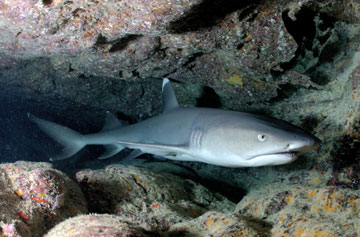Great Barrier Reef shark populations collapsing finds study
Great Barrier Reef shark populations collapsing finds study
mongabay.com
December 4, 2006
Coral reef shark populations are declining rapidly due to fishing according to research published in the December 5th issue of the journal Current Biology. The paper says that “no-take zones” — areas where fishing is prohibited — can be effective in protecting sharks but only when the no-take regulations are strictly enforced.
Examining two common species of sharks on the Great Barrier Reef in Australia, the researchers found that both populations are in the midst of a rapid population decline — 7% per year for white tip sharks and 17% per year for gray reef sharks, showing that current shark conservation strategies are not effective.
“These findings indicate that current management of no-take areas is inadequate for protecting reef sharks, even in one of the world’s most-well-managed reef ecosystems. Further steps are urgently required for protecting this critical functional group from ecological extinction,” wrote the team of researchers led by Dr. William D. Robbins of the School of Marine and Tropical Biology at James Cook University in Townsville, Australia.
The researchers say that because sharks are “apex predators” that play an important role in “maintaining healthy reef ecosystems”, their decline threatens the overall welfare of the reef ecosystem. As an example, the authors cite overfishing of sharks as a possible contributing factor to the collapse of Caribbean coral-reef ecosystems.
 White tip reef shark under a ledge in the Northwestern Hawaiian Islands reserve. Image courtesy of NOAA. |
Robbins and colleagues say that immediate action is needed to stem shark population decline on the Great Barrier Reef.
“The apparent failure of no-take zones to protect sharks makes it clear that the mere legal prohibition of fishing in marine protected areas is inadequate; such prohibitions must be part of statutory or community-based enforcement regimes that achieve nearly universal compliance from reef users”, the write. “Our data suggest that for coral-reef sharks, immediate and substantial reductions in shark fishing will be required for their ongoing collapse to be reversed.”
At 1400-miles long, the Great Barrier Reef is the world’s largest coral reef. It plays a key role in the Australian economy, attracting more than 2 million tourists a year who spend some $3.3 billion of reef-related industries. However in year years scientists have warned that higher sea temperatures and increasingly ocean acidity due to carbon dioxide emissions put the future of the reef in peril. Ove Hoegh-Guldberg of the University of Queensland has said that the Great Barrier Reef could lose 95 percent of its living coral by 2050 should ocean temperatures increase by the 1.5 degrees Celsius projected by climate scientists
Sharks are increasingly threatened by commercial fishing — especially for their fins which are considered a delicacy in some Asian countries. A study published in the October 2006 edition of Ecology Letters estimates that between 26 million and 73 million sharks are killed each year for their fins.
Citation: “Ongoing Collapse of Coral-Reef Shark Populations.” Robbins, W.D., Hisano, M., Connolly, S.R., Choat, J.H. Current Biology 16, 2314—2319, December 5, 2006. DOI 10.1016/j.cub.2006.09.044